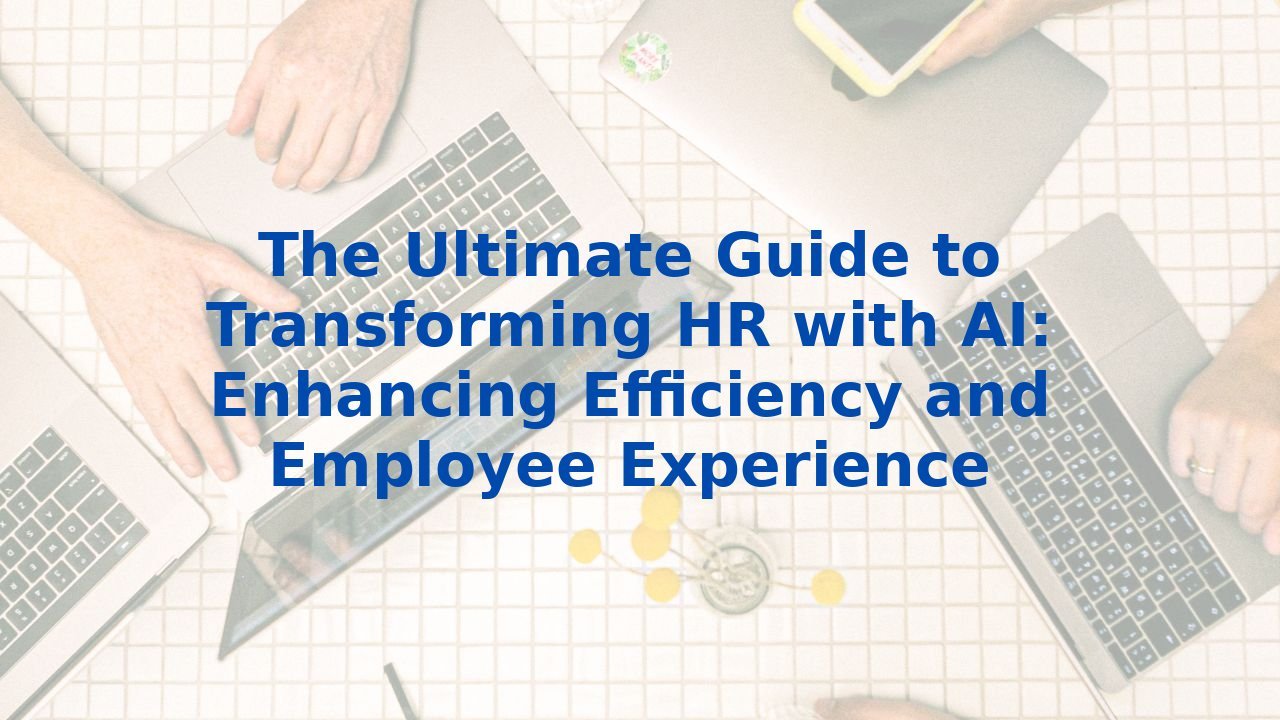The Ultimate Guide to Transforming HR with AI: Enhancing Efficiency and Employee Experience
The Ultimate Guide to Transforming HR with AI: Enhancing Efficiency and Employee Experience
In the ever-evolving landscape of business, the role of Human Resources (HR) stands at the intersection of employee satisfaction and operational efficiency. As the backbone of any organization, HR faces the daunting task of juggling strategic planning, employee engagement, and the intricate web of legal compliance. But what if there was a way to streamline these processes, allowing teams to focus more on what truly matters? Enter artificial intelligence (AI)—a transformative force poised to redefine HR.
The Challenges of Traditional HR Management
Traditional HR management is no walk in the park. From recruitment and performance management to employee development and compliance, the challenges are abundant and complex. The sheer volume of paperwork, the burden of record-keeping, and the need for nuanced understanding of employee issues create a labor-intensive environment.
Adding to this are the evolving expectations of employees who seek personalization and immediate solutions. As organizations strive to maintain efficiency, the traditional HR approach often falls short, leaving teams overwhelmed and resources stretched thin.
The Role of AI in HR
AI has emerged as a game-changer, automating numerous routine tasks and enabling HR professionals to reclaim time for strategic initiatives. Here’s how AI is transforming various HR processes:
1. Recruitment and Hiring
Imagine a recruitment process where AI swiftly analyzes thousands of resumes, matching candidates to job criteria with impressive accuracy. By automating initial screenings, HR personnel can focus on engaging the best talents in meaningful discussions. Furthermore, AI-driven chatbots enhance the candidate experience by providing immediate feedback and assistance, fostering a positive applicant journey.
2. Performance Management
Performance evaluations can often feel subjective, but AI changes the game. Analyzing data from attendance records, project completions, and peer feedback allows AI to provide a factual foundation for evaluations. This data-driven approach helps managers craft personalized performance reports, making informed decisions that resonate with employee strengths and areas for development.
3. Employee Development
Every employee has unique skills and aspirations; AI can recognize and harness this individuality. By delivering tailored learning recommendations and creating custom training programs, organizations can offer training exactly when it's needed, ensuring employees are primed for success at every step of their journey.
4. Compliance and Risk Management
Compliance isn’t merely a checklist—it’s an organization’s lifeline. AI excels in monitoring adherence to labor laws, minimizing the risk of oversights. Predictive analytics equip HR teams with insights that allow them to proactively address potential legal issues, safeguarding the organization against costly mistakes.
Benefits of AI in HR
Integrating AI into HR processes brings forth a wealth of benefits:
1. Increased Efficiency
No one wants to waste time on repetitive tasks. AI can take on the mundane, freeing HR personnel to devote their energies to strategic initiatives that foster organizational growth.
2. Improved Accuracy
Human error can be costly. AI’s ability to process and manage large sets of data in real-time ensures information is not only accurate but also available at a moment’s notice, leading to better decision-making and enhanced compliance.
3. Enhanced Employee Experience
Personalization is key in today’s workplace. AI-driven tools can offer tailored solutions that cater to employee needs, thereby boosting engagement and satisfaction within the organization.
Training Employees for AI
While the advantages of AI in HR are undeniable, financial investments in technology must be complemented by investing in human capital. Training employees to leverage AI tools is crucial for unlocking their full potential:
1. Improved Productivity
With the right education, employees can harness AI’s capabilities to streamline their tasks. The result? A significant boost in overall productivity.
2. Enhanced Decision-Making
With a solid grasp of AI tools, employees are equipped to make more informed, data-driven decisions. Real-time analytics become a trusty ally as they navigate challenges.
3. Adaptability
The world moves fast. Employees trained in AI are better suited to adapt to new technologies and processes, ensuring that the organization remains ahead of the curve.
Conclusion
The integration of AI in HR is not just a trend; it’s a revolutionary shift that paves the way toward efficiency and elevated employee experiences. As routine tasks become automated and decision-making is enhanced through data, organizations can embrace a future where HR is not a burden but a strategic partner in achieving business objectives. To unlock the full spectrum of benefits, it’s critical to invest in training employees to work effectively with AI tools. In doing so, organizations will not only streamline operations but also cultivate an environment ripe for innovation and growth.
For organizations ready to embark on this transformative journey, consider exploring comprehensive training solutions to equip your workforce with the necessary AI skills. Embrace the future of HR today and turn challenges into opportunities.



